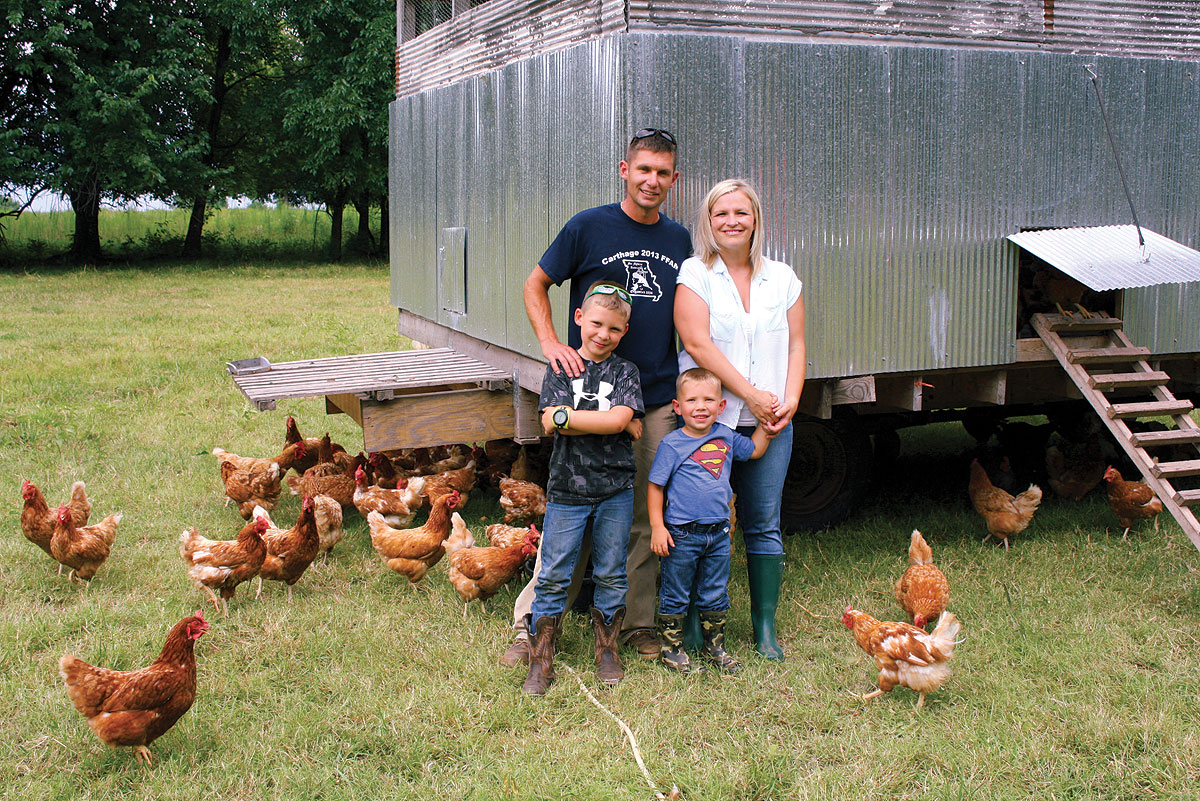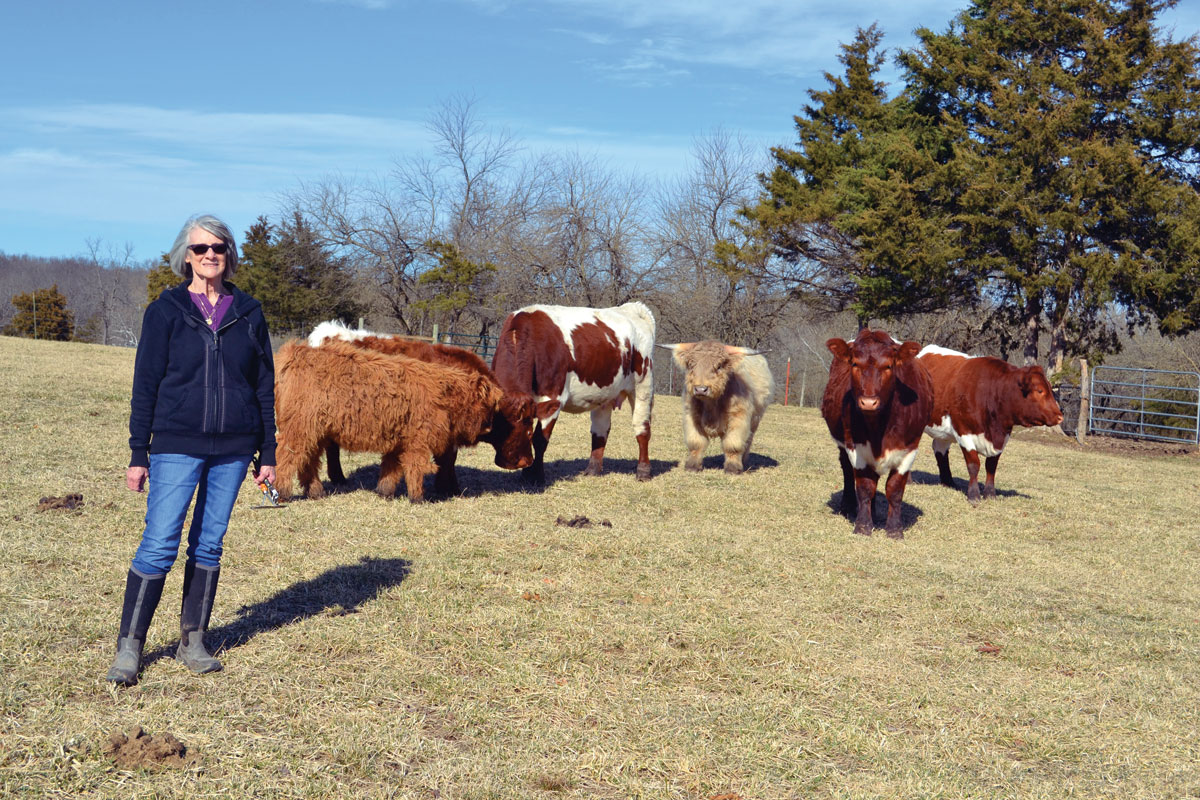
As the parents of young children, Josh and Brittany Garrett wanted a way for Brittany to work from home. After a little research, they discovered farming could be what they were looking for, but not just any farming.
At Garrett Family Farm, Josh and Brittany produce non-GMO, beef, pork, chicken, turkey and eggs, which customers purchase at the farm or at farmers markets.
“We started out with several backyard chickens and went from there,” Brittany explained.
The couple, who began their farming operation near Carthage, Mo., in 2015, wanted to take a natural approach to animal production, and discovered the works of Joel Salatin, who is considered a pioneer in the use of holistic management methods in livestock production.
“Our goal is produce the best meat we can at a fair price so that people can afford to buy it,” Brittany explained.
The couple owns no breeding stock, opting instead to purchase just-weaned pigs and calves. Chickens and turkeys are purchased from hatcheries.
The Garretts have animals of different ages and weights in order to accommodate the needs of their customers throughout the year. Turkeys tend to be seasonal, but the Garretts like to have dressed chickens available at all times. They also have fresh eggs year round.
In their current system, the pigs, birds and cattle complement each other. The pigs have helped loosen compacted soil through their rooting, and help eliminate undergrowth in wooded areas of the farm.
“The hogs are in the trees,” Josh said. “The pigs clean up the brush under the trees and gives the grass a chance to catch back up. Instead of us spending money brush hogging, we use the pigs.”
The couple buys pigs from a nearby producer who farrows a number of sows. Luckily, if an animal becomes ill, the producer will exchange it for another weanling. Pigs are raised to about 300 to 325 pounds before they are processed.
Chicks and turkeys are given a non-GMO feed prior to being moved to a hoop house or chicken tractors, which are also rotated daily. It takes about six months for a turkey to reach weight for butchering, and meat chickens are butchered at about nine weeks. The broilers and turkey are provided with a non-GMO feed.
Josh and Brittany said the previous owners overgrazed pastures, but allowing pastures to rest has resulted in the return of grass and other plants, without over seeding.
“We’re just trying to do what God intended, letting the animals graze.
“Mother Nature is going to take care if a lot of problems, but you have to let her take care of them; you just can’t keep running cows. We now have clover, Bermudagrass and others.”
Cattle are typically rotated to new grass daily. Because cattle are not kept on the same pasture for weeks at a time, the Garretts believe they are able to interrupt the lifecycle of parasites, eliminating the need for any commercial wormer. For fly control, they utilize organic products.
Supplemental minerals and salt are given free choice to cattle. The type varies by the season, and diatomaceous earth is offered year round, but no grain is given.
Calves are purchased at weaning by the Garretts from Josh’s step-father, Chuck Zordel, who is a cow/calf producer in Oklahoma. Once in Missouri, the calves are raised to 23 to 24 months of age, or about 1,000 pounds.
“The calves are never touched,” Josh said. “They are separated and we get them when they are weaned. If something does get sick, we just don’t take that calf. I have 120 calves to look at and pick out what we want. They have never been vaccinated, never had grain, never had anything.”
While having their own cow/calf pairs in the future is a possibility, but it’s not in the budget at this time.
“This is our way to get in,” Josh said. “Right now, if I have a problem, I can just take the cattle back home, like if the grass quits growing or something else happens. If I had 60 head of momma cows, that wouldn’t be possible.”
Laying hens follow the cattle in the rotation at Garrett Family Farm. Chickens roam the farm during the day and are contained at night in portable and elevated chicken house.
“They are usually three days behind,” Josh explained. “When we went to free range, the chickens were able to run around and it worked so much better.”
Unfortunately, predator loss has taken a toll on their laying hens, and the Garretts are in the process of repopulating their flock.
“We lost about 200 chickens in three months,” Brittany said. “We were getting about 16 dozen eggs a day, then we were down to four dozen. We were able to go to a gentleman, who does what we do, who was selling out.”
The Garretts do not utilize commercial fertilizers for their pastures, instead they rely on litter from their brooding facility and hoop house to create compost, as well as manure deposits left by the cattle and scattered by the chickens.
Josh said they are not concerned about what breed of livestock they have to offer customers because customers are buying a finished product, not a breed.
“As long as they finish out in the timeframe we want, I don’t care what they are,” he said. “I’m not big on heritage breeds or thing like that.
While the farming program began as an opportunity for Brittany to work from home, the ultimate goal is for Josh, who is a full-time firefighter, to be able to call himself a fulltime producer as well.
Because neither Josh or Brittney were able to take over family farms, they hope their children, 7-year-old Tucker, 4-year-old Jax, and infant Gracie, will one day have the desire to take over Garrett Family Farm.
“We want to build and grow so our kids and their families are a part of this,” Josh said. “Our goal is if our kids want to farm, we want them to farm. We want them to have a choice. Me and Mom will go over and build us a little bitty house and the kids can just take over.”






